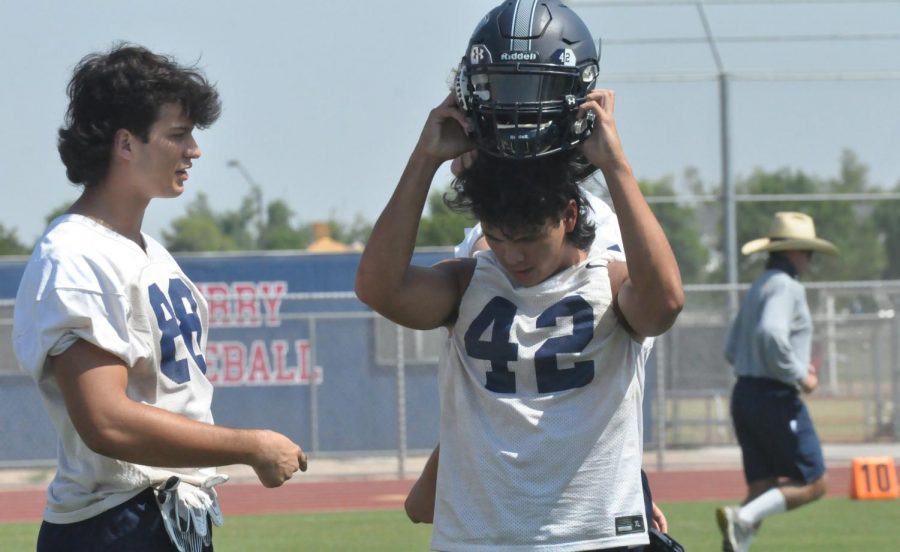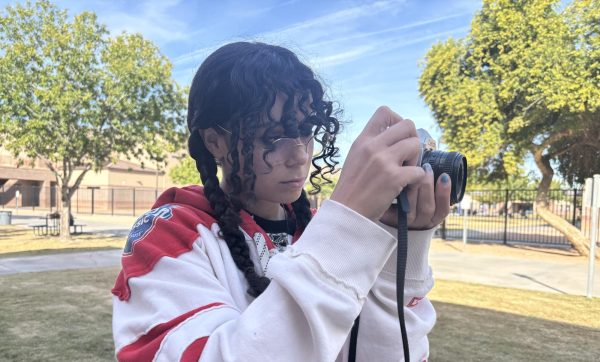Athletes struggle to cope with mental health
Senior Mason Mesias ends practice early before gameday. Football has their locker class 6th hour where they will usually discuss previous games or get in extra practice which flows into the hours they spend practicing after school.
In the world of sports, it is not uncommon for athletes to disregard their own mental health for the sake of success in their sport. It is human nature to always want to be successful and do the best you can. For athletes, success is the main goal.
“My coaches just were not motivational,” said senior gymnast Kauri Hunsaker, “they would tell me I didn’t work hard enough and wasn’t going to get anywhere…they definitely pressured me more to be perfect at everything.”
Whether it be a team or individual sport, athletes have an added weight on their chest of always having to be perfect and at their best if they want to do good. This type of pressure would be overwhelming for anyone, so for teenagers having to deal with it on top of what they deal with regarding school, many of them end up being too busy worrying about being perfect to check how they are doing mentally and take time to care for themselves.
“You put so much time and effort into the sport that it’s hard to balance all the other things as well,” said senior football player Mason Mesias, “school work, homework, NHS, family commitments, it’s a lot of stress.”
It does not help that athletes often do not have access to or are provided with proper resources and services to help them with their mental health. As a result of this, they rely on other things to help them deal with whatever they are feeling. Where some would typically rely on the sport to de-stress them if they were feeling stressed from school, they now must find a different outlet if that sport is the one causing the stress.
“Personally, I’m someone who gets in their head very easily,” said senior soccer player Kyler Askland, “so I bring a lot of the stress on myself…to help me throughout games I kind of have to speak to myself underneath my breath like positive words or statements just to get out of my head.”
For a lot of student athletes, their sport is their whole life. Many of them have been doing it for as long as they can remember and have planned their whole future around it. But, being an athlete, there is always the risk of getting injured. Some injuries can be healed and dealt with in time and, if they are lucky, they can return to their sport as if nothing happened. But not everyone is that lucky.
“I tore my ACL 3 weeks ago. I won’t be able to participate in my senior high school or club seasons, I have surgery in 3 weeks and after that I won’t be able to go to school events or games how I would like to. My mental health has definitely gotten worse because of [my injury],” said Askland.
By high school, most athletes have been playing their sport for their whole life, and losing the chance/ability to play is like losing a part of themselves. After high school only around 7% of student athletes go on to play in college (Scholarshipstats.com). These athletes have to deal with the fact that something they have been committed to for years and spent countless hours working on, could be gone due to one mistake. That is a huge burden to carry and, still, most either try to deal with it by themselves, or do not deal with it at all.
When it comes to mental health, the smallest actions can have the biggest impacts. It is important to note that everyone has different needs, and there is not one be-all end-all. As mentally strong as athletes are, they are human. And something is always better than nothing.

Sabrina Digne is a senior attending Perry High School. She is a third year newspaper student and is the sports editor as well as a reporter for pom/cheer...

Holy cow this is Presley's third time writing a description for herself; however, this year she is the managing editor (not a staff reporter)! After working...






